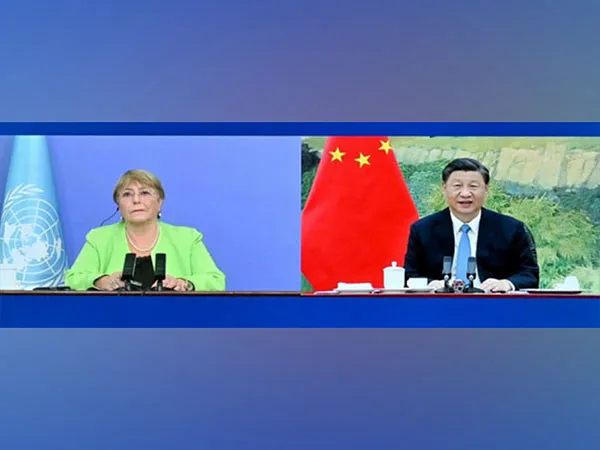In a series of events in the last one month, China has managed to fool the international community, and specifically the United Nations Human Rights Commission (UNHRC).
What many are calling a “propaganda coup” by the Chinese government is a reference to UNHRC head Michele Bachelet’s controversial and embarrassing visit to China last month (May 23-28).
After several delays in the last four years, Bachelet got a rare chance to visit Xinjiang Uyghur Autonomous Region (XUAR) to get the real picture of human rights abuses against the Uyghurs, Kazakhs, and other Turkic Muslims. Bachelet and a team from the Office of the High Commissioner for Human Rights (OHCHR) spent six days in Guangdong and Xinjiang.
In an utter shock to UNHRC, the international community and human rights organizations around the world, Bachelet almost gave a ‘clean chit’ to Beijing on its treatment of Muslim minorities living in Xinjiang. During her press conference on the last day of her six-day official visit to China, she parroted the Chinese propaganda by using terminology favoured by Beijing, including “vocational education and training centre” (VETC).
VETCs are the Chinese government’s name for a network of facilities in which an “estimated one million Uyghurs have been detained and allegedly subjected to human rights abuses.” Furthermore, Bachelet was insistent on not labelling the visit as “an investigation” into Beijing’s state-sponsored human rights abuses against Uyghurs in Xinjiang.
Under her leadership (September 2018-till now), the UNHRC has so far failed to bring out the much-anticipated report on the human rights situation in Xinjiang. According to media outlets, the Xinjiang report was completed in September 2021, however, there is no sign of its official release by UNHRC. Moreover, Bachelet’s term as the UN High Commissioner for Human Rights is ending in September this year as she has decided not to run for the second term after her contentious trip to China.
There are speculations that the report could be released after the incorporation of inputs from Bachelet’s recent visit to China. However, there is uncertainty on that, and it appears that the report may not release until Bachelet leaves office in September.
The non-publication of the report is also a sign of China’s increasing clout over the UN’s human rights bodies. Beijing organized Bachelet’s visit at a time when some parts of China were facing COVID-19 lockdowns and there were restrictions on public movements across the country. Chinese authorities used that reason to limit Bachelet’s highly organized tour to two locations in Xinjiang.
She was not allowed to speak to any detained Uyghurs or their families and was accompanied by government officials while in the region. On the other hand, Bachelet’s visit coincided with the release of the “Xinjiang Police Files,” a major cache of leaked official documents, speeches, and images providing a ground-breaking inside view of the camps in Xinjiang.
Yet she made no reference to this evidence during her press conference. Secondly, no journalists were allowed to accompany her during the visit. It was obvious that China did not want any information of human rights abuses going out of the Xinjiang region.
Thirdly, in the global context of the Russia-Ukraine war, a looming food and energy crisis, distracted world amid increasing geopolitical tensions, etc, Bachelet’s six-day visit, and her embarrassing media statement could appear less significant.
However, the international reaction on Bachelet’s terrible PR campaign in China was immediate and strong. Government officials, human rights organizations, and Chinese diasporas in the West raised serious doubts over the visit and targeted Beijing for the clever play to use the UNHRC chief to ‘whitewash’ claims of systematic human rights abuses against Uyghurs and other minorities.
Ahead of the 50th Session of UNHRC (Jun 13-Jul 8), the Netherlands read a joint statement on behalf of 47 countries in the UNHRC on the human rights situation in China. In that statement, the Netherlands, and a large group of countries “expressed their grave concerns about the human rights situation in China, especially in Xinjiang.”
Besides the yearly ritual, this joint statement could be seen as a multilateral effort to counter Chinese propaganda at the UN. Lastly, Bachelet’s visit is a good example of how China uses the UN bodies to its advantage, as and when required to fulfil its purposes. The visit has provided a much-required propaganda material for the Chinese government to use whenever it is accused of human rights violations in the future.
China promotes a “state-centric” and “anti-U.S.” human rights narrative that has gained traction among countries outside the “Global North.” Beijing has virtually taken over the Advisory Committee, the Human Rights Council’s think-tank, and it has generally “facilitated a gradual erosion of human rights standards.”
As a counter to the Western grouping against China, ahead of the 50th Session of UNHRC, a representative from Cuba made a “joint speech, on behalf of 70 countries, to oppose using human rights as excuses to interfere with China’s internal affairs, saying that human rights issues should not be used as political tools.”
This shows China’s intensive diplomatic outreach at the UNHRC to spread its propaganda on vital human rights issues with the help of other autocratic, poor, and weak countries.

